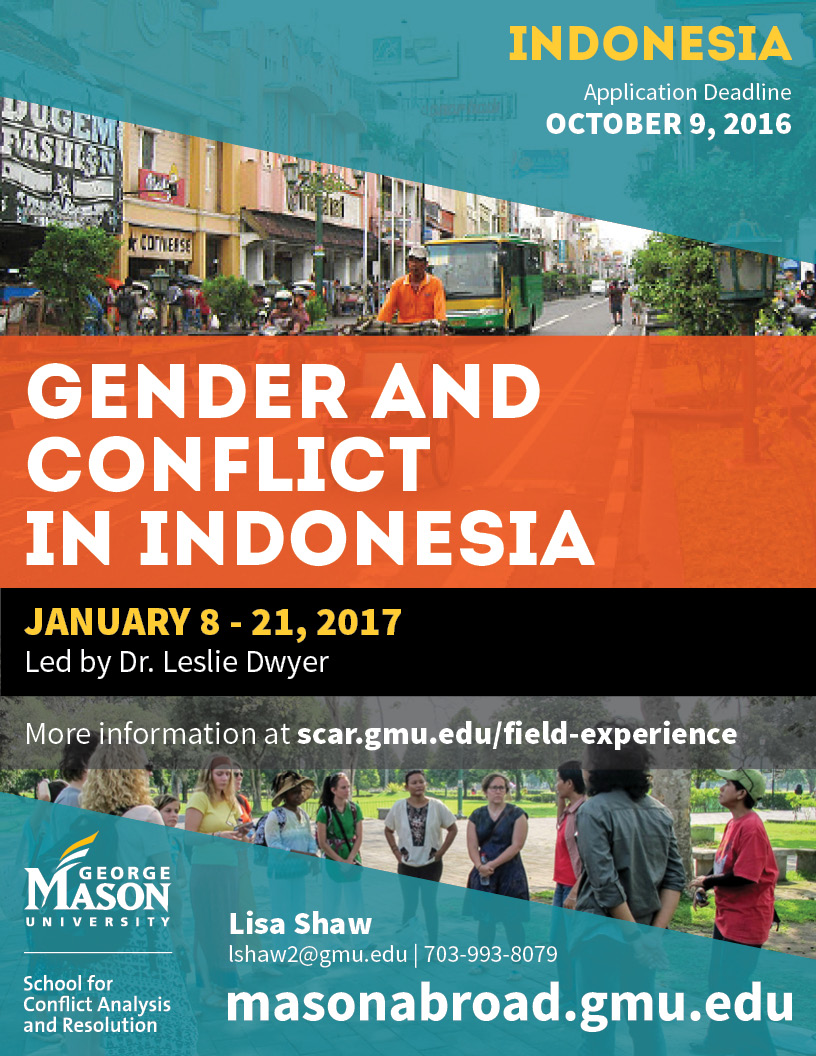
Revised Application Date: Friday, November 11 at 11:00 p.m.
Indonesia is a land of breathtaking contrast. The fourth most populous country in the world, it is a place of extraordinary diversity, home to more than 300 ethnic groups speaking over 700 languages. It is home to the world’s largest population of Muslims, and also to substantial Christian, Hindu, Buddhist, Confucian and animist minorities. And as the world’s third largest democracy, it has made extraordinary strides towards ensuring civil rights and freedoms for its citizens. Yet Indonesia today is facing tremendous challenges. The legacies of state-sponsored violence and ethnic conflict that marked Indonesia in the 20th century have yet to be addressed, and communities of survivors continue to call for truth and justice. Indonesia’s environment is under threat from unrestrained development and corporate greed, as well as the ravages of climate change. In many parts of the country, traditional tolerance for cultural and religious difference is giving way to heightened religious conflict, and widespread corruption continues to mark Indonesia’s democratic progress.
This course will explore Indonesia and its challenges by turning a gendered lens on issues of conflict, civic engagement, violence, development and justice. Working in close collaboration with a range of local organizations, course participants will learn about the experiences of Indonesian women and men working for a more equitable future. While visiting the Indonesian islands of Bali and Java, participants will engage with a trans-disciplinary range of social theories and materials from U.S. and Indonesian contexts, investigating issues related to the social construction of gender, gender and culture, gender and religion, post-colonial feminism(s), the political economy of gender in Indonesia, and gender and post-conflict peace-building. Students will visit with local NGOs working on gender justice, gender-based violence, transitionaljustice, migration, violent extremism, fair trade, and inter-religious conflict resolution issues.
Students will gain valuable international experience with issues of gender, culture and conflict, as well as a deep theoretical grounding in the analysis and resolution of gendered conflicts. Through intensive engagements with a range of local communities and organizations, students will gain new perspectives on the cross-cultural dimensions of conflict and gender, as well as an understanding of diverse strategies for social change.
Video credit: Rachel Montegudo 2015
Dates of Course: January 8 to January 20, 2017
- January 8 - Full day class session at George Mason University
- January 9 and 10 - Departure and in transit to Indonesia
- January 11 thru 19 - Course in Indonesia
- January 19-20 Departure and return to the U.S.
Application Due Date: Friday, October 28 by 11:00 p.m.
- Deposit Due ($500): Friday, November 18 by 5:00 p.m
- Final Payment Due: Monday, November 28 by 5:00 p.m.
Pre-Trip Meeting Date: Sunday, Januar 8 at the Arlington Campus, Metropolitan Building, Room 5183. Students are required to attend the pre-trip meeting.
Post-Trip Meeting Date: TBD

Cost of Course:
Lodging
 Dr. Leslie Dwyer
Dr. Leslie Dwyer

Previous Trips
- Approaches to Conflict Management and Resolution: Field Work with Syrian Refugees in Jordan - Spring 2017
- Brazil - Summer 2016
- Indonesia - Gender and Conflict - Winter 2017
- Indonesia - Research Methods - Summer 2016
- Malta - Bridging Differences: Migration in the Mediterranean Spring 2017
- Northern Ireland - Summer 2016
- Reflective Practice in Israel/Palestine Winter 2017
- Spain: From Victimhood to Social Justice Basque Country Spring 2017
- The Balkans - Summer 2016


